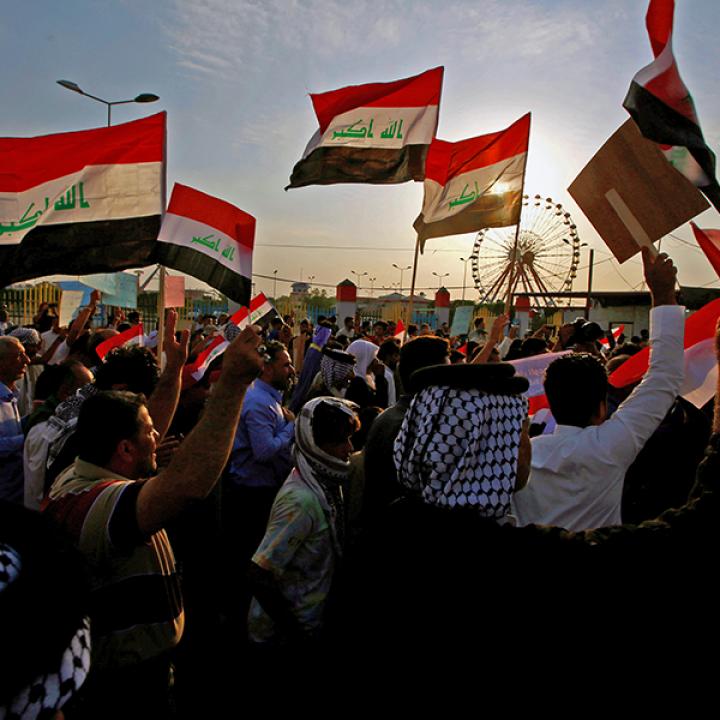
- Policy Analysis
- Fikra Forum
Iraq’s Next Generation: A New Political Class Struggles to Rise

On October 10, a new generation of Iraqi voters, who have lived their entire lives in a fledgling democracy rife with bureaucracy and corruption underpinned by sectarian patronage networks, could have their say in who governs them.
With a political consciousness heightened by the October 2019 “Tishreen” Revolution, this next generation wants a seat at the table of the Iraqi state. Despite frustration with the ruling political establishment, which has manifest in depressed voter turnout rates in the previous 2018 elections and persistent protests over the past few years, many new and independent actors want access to the halls of power.
Iraq’s new electoral system, shifting away from party lists and toward individual candidates, can provide an opportunity for new ideas and new leaders to emerge—but only if voters ignore the increasing calls for boycotts and head to the polls to make their support for these reformers heard. New voices emerging from the Tishreen Revolution are seeking to upend a system that has excluded them for the past eighteen years. They are not the only ones looking looking for success at the polls: moderate, establishment political actors seek to supplant those they’ve followed and pursue the spotlight independently, while those from militias and their affiliates are working to reimagine their relevance and portray themselves as Iraq’s savior once more.
Almost two decades after the U.S. invasion of Iraq, the country’s democracy is progressing unevenly. But while the country suffers from lengthy government formation processes and all-too-frequent reinterpretations of the Constitution and federal laws, the democratic system is holding, albeit imperfectly. This is because the political consensus in Iraq prioritizes self-interested stability over chaos—political leaders and parties support incremental reforms because they benefit from their current web of connections and business deals.
Today, there is strong desire for change in the Iraqi street. Recent polls show that the public takes a dim view of political parties as institutions and does not trust other key democratic institutions, such as parliament and the prime minister’s office. Grand Ayatollah Ali al-Sistani’s widely quoted phrase “those who have been tried before, should not be tried again” ( المجرب لا يجرب ) clearly resonates in 2021, shown lately by his recent statement calling for Iraqi’s informed, responsible participation to elect sovereigntist candidates that can replace the incompetent and the corrupt who have mistreated the country and constitution. Assuming Iraqis come out and participate, these elections can begin to channel this desire for change and give rise to a new generation of politicians—emanating from multiple ideologies that include Iraq’s moderates, civic protestors, and externally influenced militias. Intra-ideological competition within these broad groups, as well as within the incumbent parties that have largely held power for nearly two decades, is likely to result in a fractured parliament that may struggle to find consensus. Competing views on what the state should look like have drawn stark lines within the political scene and though some moderate incumbents and new Tishreeni voices have common ground, jointly working towards reform is, and will continue to be, undermined by ego-driven competitions for power.
Yet despite Iraqis’ hopes for change, the election is unlikely to have decisive results without an increased turnout and will otherwise likely lead to protracted negotiations to form a government. A new electoral system—combined with political parties’ infighting and inability to organize into viable coalitions—means some winning candidates might be elected with very few votes. This will almost certainly prompt legal challenges and “sour grapes” media campaigns run by those unhappy with the outcome.
The political losers will malign the process, the electoral commission, and the technology used for voter identification and counting ballots, and these complaints will find fertile ground. A weak public communications effort has left many people confused about the new electoral system, and this creates a significant risk of disinformation. But to be clear, the fundamental problem is not the process, it is the parties’ own fragmentation and their failure to offer voters appealing political choices.
Iraq’s elections are set for success from a technical perspective, with the election commission taking all necessary steps to ensure transparent, accurate results. The legal framework is also in place, though adjusting to this year’s new electoral system is sure to be fraught with challenges—including the proper application of Iraq’s quota system, which allocates a minimum of 25 percent of all parliamentary seats to women. Now all that is really needed to make the elections a success is needed, or else the cycle of disenfranchisement and disillusionment will continue to worsen. Elections are just a point in time, a step forward on Iraq’s path toward democratic development. Engaging Iraqis and encouraging them to have a voice in their political process, both during and after elections, is critical to building a democratic country.


